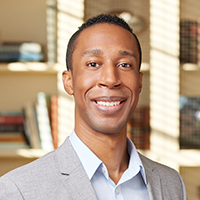Quinton Taylor
 Quinton Taylor
Quinton Taylor
Senior Associate Director of Federal Program Operations
Johns Hopkins University
EASFAA
Meet Quinton Taylor. Like many in the financial aid profession, Quinton took a bit of a circuitous route to the field he now calls home. Educated and trained as a civil engineer, Quinton was laid off during the 2008 financial crisis and eventually found a job posting for a financial aid counselor in his local newspaper at a third party company that did admissions and financial aid work for about 60 colleges and universities.
He then took a role in the financial aid office at Remington College outside Nashville, Tennessee, before moving on to serve as coordinator of financial services at Cumberland University, also located near Nashville.
“It became crystal clear for me once I actually got into the college setting, I knew at that point, not even six months into the job, I just knew that this is what I want to do,” Quinton said. “So from that point I just really tried to learn as much as I could about the financial aid industry itself.”
After about a year and a half at Cumberland, Quinton landed at Johns Hopkins University in Baltimore, where he has been for more than seven years. He started as an assistant director in the financial aid office and has worked his way up holding multiple positions, currently serving as the interim director.
Learn more about Quinton and his career in financial aid in the brief Q&A below.
How have you seen diversity in higher education change since you began your career?
Over the course of my 12 years working in higher education, I've seen a good faith effort to increase diversity among the student population and university administration. And just in the past few years alone, I've noticed a good number of leadership roles pertaining to diversity, equity, and inclusion (DEI), which shows that institutions are taking the important steps to have a leader or a group of people to focus solely on making strides toward a diverse and inclusive institution.
While I’ve seen some great advancements in diversity within higher education, I think that as an industry we still have a long way to go because I would like to see more diversity in leadership outside of your typical DEI roles.
What’s a challenge within financial aid that you personally have overcome that you're proud of?
Not pertaining to just the financial aid industry, but back when I was working in the engineering field as well, I had to personally overcome being the only person of color. I’ve had to personally overcome being the only one or the first [person of color] in a number of professional settings. When I was in my early twenties, it bothered me to be the only person of color in an office or a division of a university, or the only staff member that openly identified as LGBTQ.
I've had people in leadership positions completely ignore me as a valued member of the team and only look to me to answer for a whole race or a group of people. I eventually overcame that anxiety of being the only person of color or LGBTQ person in the setting because I've realized that it gives me the opportunity to educate. And it really did become apparent that people are legitimately curious about another perspective. So nowadays if I were to be the only person of color or LGBTQ person in a room, and I were to get questions, I know that it's coming from the perspective of ‘We don't know,’ or ‘I don't know, what is your take on this?’ So I actually welcome that now.
What advice do you have for those in financial aid?
For newer professionals in financial aid, I would say stick with the industry, because we need you. Financial aid is a great industry to be in and it's rewarding to think about the thousands of students that you will impact in a positive way through just being there for them when they need guidance.
My advice for financial aid veterans would be to think about picking up a couple of financial aid mentees if you have the time. I've been privileged to have a handful of mentors that I can rely on to help guide me professionally. I have this small network of people that I can bounce ideas off of, so I'm very fortunate for that.
What do you do when you're not working?
Before the pandemic, you could find me in Washington, D.C. or New York City shopping or experiencing different restaurants and foods almost every single weekend. During the pandemic, I'm spending more time secluded from crowds and doing new activities that I would have never done pre-pandemic, such as camping. You could not pay me to camp prior to the pandemic. But now I enjoy camping or spending the weekend in the mountains.
Any goals for the year?
Professionally, I would like to earn the FAAC® designation through NASFAA and I would also like to volunteer more in professional financial aid organizations.
My personal goal for the year is to finally have my Italian wedding, which has been pushed back two years now due to the pandemic. The ceremony was supposed to be in 2020 and it kind of just went to hell. It's going to happen, and things are looking good as far as being able to fly out and make it there and make it happen.
Publication Date: 2/4/2022




You must be logged in to comment on this page.